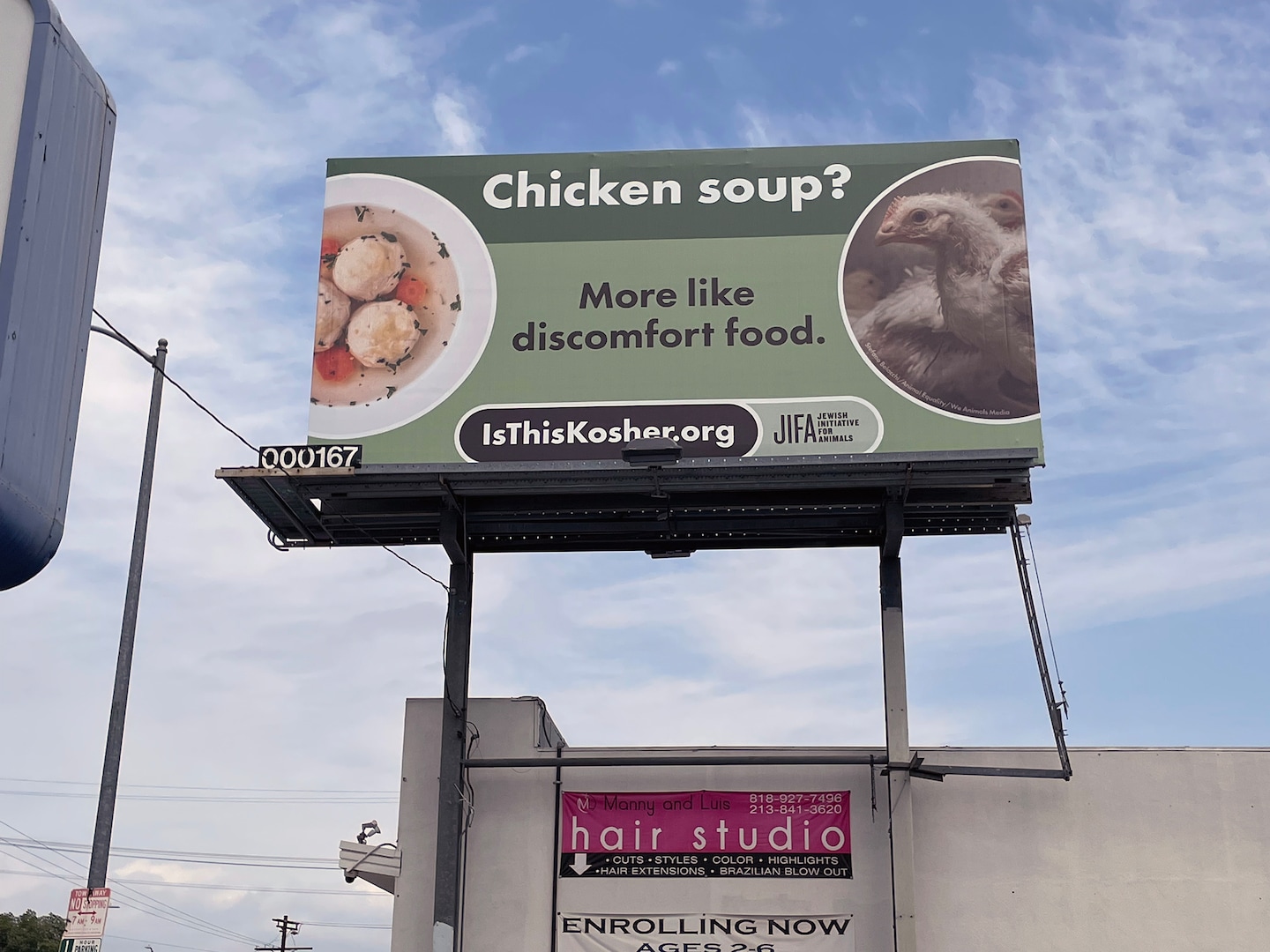The term kosher applies to all animal products: meat, dairy products and eggs, explained Rabbi Jonathan Bernhard, executive director of JIFA. What determines whether something is kosher or not is the nature of the animal and how it is treated.
JIFA notes that Jews and non-Jews alike spend a lot of money on kosher meat, seeing it as a “stamp of approval” for a better, healthier, and more humane product for animals and workers.
“But none of that is true,” the organization says.
Kosher animal production is no different from conventional factory farming, according to JIFA. The organization cites data from the Sentience Institute think tank showing that 99% of all animals are now factory raised, including what JIFA says is “virtually all kosher beef, dairy, poultry, eggs and farmed fish”.
The term “factory farm” is commonly used to refer to large industrialized facilities that raise animals for food, but it is not a legal or scientific term, according to the Natural Resources Defense Council.
“When people hear the word kosher, they have an association as to how that animal is treated, and our response is that’s no longer true,” Bernhard said.
For Bernhard, the industrialization of the food process has “distorted” the values that “people hold and would like to see practiced in the way we treat other sentient creatures.”
Through this campaign, JIFA aims to shed light on the growing consumption of chicken and poultry farming conditions, aquaculture or controlled fish farming, and artificial insemination of cows. It also sheds light on the working conditions of the factory’s employees. The United States Department of Labor notes that meat processing workers are “exposed to biological agents during slaughter” and when “handling freshly slaughtered meat.”
JIFA billboards were placed in the Pico-Robertson and Tarzana neighborhoods as well as in the cities of Beverly Hills and West Hollywood, areas where the Jewish community is prevalent, Bernhard said.
Bernhard said the billboards are “designed to be an invitation to a conversation.”
The notice boards direct people to the JIFA website, where they can find information on farming practices. For Bernhard, the most sustainable way to be kosher is to follow a plant-based diet, although, he said, “that doesn’t mean they have to be vegan.”
“We want communities, institutions, congregations, schools… to think about this and work with us to change their food policies,” he said.
Adrienne Krone, assistant professor of religious studies and environmental science at Allegheny College, said issues around kosher food and sustainability are nothing new.
She noted that Rabbis Arthur Waskow and Zalman Schachter-Shalomi discussed eco-kashrut, or eco-kosher, in the late 20th century and raised the issue of rethinking the kosher system. given the rise of processed industrial foods.
Now, as more and more people pay attention to climate change and how agriculture contributes to the carbon impact, Jews are “starting to say there might be a better way to do it, being given the impact our food system has on the planet,” said Krone, who teaches a “Judaism, Justice and Food” course.
Krone, who sits on the board of JIFA, acknowledges the difficulties of limiting certain foods so closely tied to Jewish identity, especially for Jews who may not attend services every week and only celebrate a few. holidays.
“What they do on those holidays becomes proportionately more of their Jewish identity, and it becomes really important that the food they eat is representative of their sense of what it means to be Jewish,” she said.
In 2019, worshipers at Temple Beth Israel in Highland Park and Eagle Rock, one of the oldest synagogues in Los Angeles, gradually transitioned to eating only vegetarian meals after hosting a Passover vegan seder that was well received.
Rabbi Jason Rosner, who joined the synagogue in 2019, said congregants discussed sustainability issues regarding kosher. They noted the Jewish principle of tza’ar ba’alei hayyim, which forbids causing unnecessary pain to any creature, and also considered the working conditions of workers in processing plants.
Kosher meat, Rosner said, must be produced in a way that respects the employer-employee relationship.
“Now that most communities in the progressive Jewish world and some Orthodox synagogues believe that global warming and climate change are issues that need to be addressed, we believe in the Jewish value that we need to take care of our planet,” said Rosner, who is vegan.
Rosner said he has seen more high-profile rabbis come out as vegetarians and vegans, such as Rabbi Shmuly Yanklowitz, as well as focusing on vegetarian Jewish food. He noted “The Vilna Vegetarian Cookbook”, the first Yiddish vegetarian cookbook in 1938 which was recently translated in 2015.
“We believe in the Jewish value that we need to take care of our planet,” Rosner said. “High-carbon foods, especially things like beef, have become a no-no for people who believe we are ethically obligated to take care of the world.”
— Religious News Service

